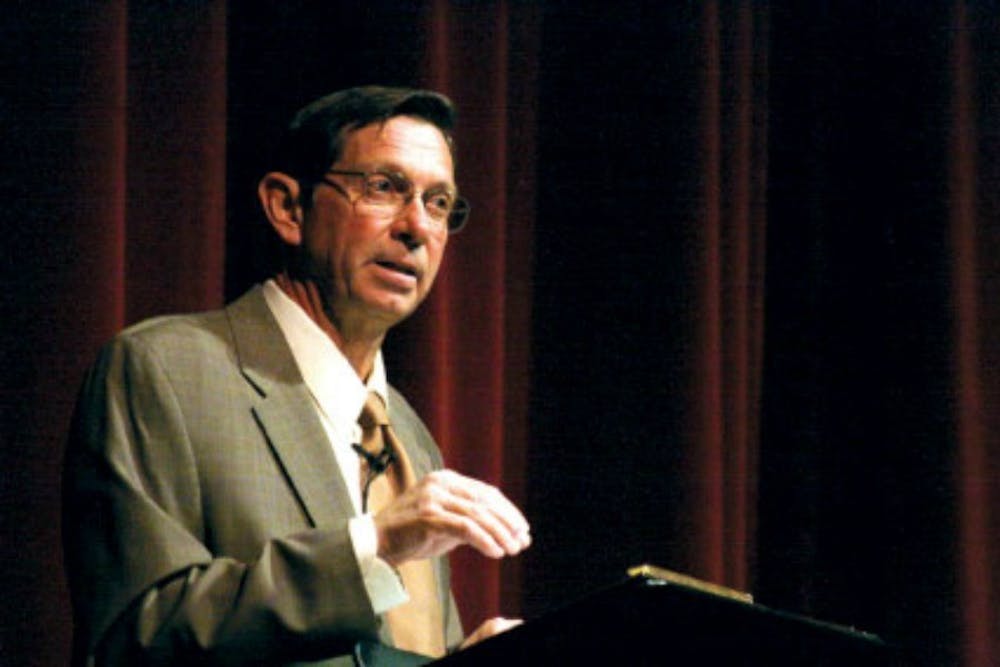By Emily Tate and Victoria Slater, Managing Editors
In the wake of President David Hodge's recent announcement to retire, the Miami community is reflecting on the accomplishments of his tenure.
During his decade at Miami, Hodge has overseen many long-term initiatives aimed to strengthen and develop the university and the undergraduate experience. His primary goal was to emphasize the importance of undergraduate teaching.
"The faculty here are so creative and innovative when it comes to education," Hodge said. "They're always trying to think about ways we can enhance what students learn, how we can better prepare them for what's going to come next, how we make those possibilities more alive. To me, that's the heart of it, and I would love to believe that I've helped to encourage that environment."
Others have lauded Hodge's efforts in this area, earning him recognition on local and national levels. Miami has ranked as a top institution for undergraduate teaching since 2010, according to U.S. News and World Report, and this year the university is tied for second place overall and first place among public schools.
Hodge's focus on undergraduate teaching has impacted other facets of Miami life, including students' overall perception of and experience at Miami.
"One of the biggest things he has accomplished is being a tireless advocate for the undergraduate experience," said Bryan Marshall, political science professor and chair of University Senate. "His vision saw through turning us into a leading institution. All of these objectives have been about the students and strengthening his relationship with them. He has really demonstrated the importance of the student experience here."
Other faculty echo Marshall. Karen Dawisha, also a political science professor and co-president of Miami's new chapter of the American Association of University Professors (AAUP), cited Hodge's relationships with students as one of his most endearing qualities.
"When David Hodge's legacy is considered, I believe he will be remembered as 'the students' president,' someone who forged a strong personal bond with many student groups across campus," Dawisha said.
He has fostered those relationships in many ways, according to senior Graham Bowling, who served a term as the student member to the Board of Trustees.
Hodge has made himself more approachable and personable through early-morning, open-invite jogs with students, Bowling said, and he attends as many student performances and presentations as his schedule allows.
Just last Monday, April 27, Hodge held an hour-long "Tweet-Up," in which he answered questions from students and parents who posted to his Twitter.
Enjoy what you're reading?
Signup for our newsletter
"@PresHodge What do you think is the #1 challenge faced by @MiamiUniversity and how can we best overcome it?" asked Jen Waller, a Miami librarian, during the Tweet-Up.
"Continuing to improve the experience for students," Hodge replied. "Need everyone to be creative and forward-looking."
In an effort to be creative and forward-looking himself, Hodge spearheaded a number of progressive campaigns, including the Miami 2020 Plan. This plan consists of a series of objectives that strive toward creating a more efficient university in its academics, research and facilities by the year 2020. Hodge considers this plan to be his greatest accomplishment.
"Our unifying goal for Miami 2020 promotes a vibrant learning and discovery environment that produces extraordinary students and scholarly outcomes," Hodge said. "If I could pick one thing and say, 'that's Miami, that's what I'm most proud to be associated with,' it would be that statement."
Marshall said the 2020 Plan helped guide Miami through "uncharted territory" during the 2008 recession, putting it on track in terms of finances and leadership.
Another initiative Hodge oversaw was the Miami Makeover, a schematic plan to renovate every residence hall on campus over the next 20 years. During his tenure, the blueprint of Armstrong Student Center was both approved and built, with the second phase still in development. Dawisha considers the student center one of Hodge's major achievements.
Despite 10 years of accomplishments, Hodge said the university is still in need of some improvements. These include enhancing engagement with alumni, increasing fundraising for incomplete projects and fostering connections with the state government.
"It's really 'more' - I don't see a thing that I would say we didn't do that I wanted to do ... we would just like to get it even better," Hodge said.
With his retirement date set for June 30, 2016, the administration must begin its search for a new president, one that faculty and students hope will rival Hodge and his achievements.
"As we look for a new president, I don't want to turn away from the things Hodge has accomplished," Marshall said. " Our student body is getting better because of our commitment to undergraduate teaching, and we should continue to focus on that."
Keith Tuma, English professor and co-president of AAUP, is hoping the administration will consider Miami's relationship with its faculty when searching for candidates.
"As we move ahead, I hope that new leadership will worry less about marketing the so-called Miami 'experience' and more about promoting the life of the mind," Tuma said. "A renewed commitment to the faculty would be part of that."
Tuma said this means hiring an increasing number of tenure-track faculty and shifting focus to the graduate program at Miami, as well as finding a balance between history and innovation.
"We want a leader who respects Miami's core mission and history, but is unafraid of change and knows about innovative things happening in higher education nationally."




